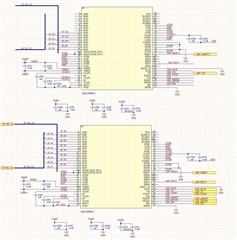Other Parts Discussed in Thread: ADS1298
I've been using the ADS131E08 on several strain gages with an external reference pulled from the bridge (6 wire strain gage config, power/gnd,2 sense, 2 analog -- well many analog). The power supply is a simple unipolar with AVSS to GND and AVDD to 3.6-4.2v (lithium battery) with some isolation. It has worked very well for accuracy but now after months of usage of the prototypes the client has experienced random death of random inputs. The reference is being pulled from the strain gages and is about 0.1V less than the AVDD to GND so it's within the allowable. We actually have two, the primary generating the clock for the secondary.
I omitted the external clamping diodes thinking they shouldn't be needed and then thought that maybe there was no ESD on the analog inputs at all but several forum posts indicate there is. Is this chip not robust?
At first a channel died on the second chip on a board, then another had 4 dead over two chips. These worked for months up until this point but now most are showing signs of this death and one recently started to overheat. We've been unable to replicate this here with our boards at all.
We only have a very basic filter on the strain gages, and the analog rail is controlled by a P-Fet high side switch. I believe I replicated the unipolar reference faithfully, but have I done something dumb here? Is there any way this could be ESD?
Note the schematic says ADS1298 but these are ADS131E08. Sloppy not updating on my part.



